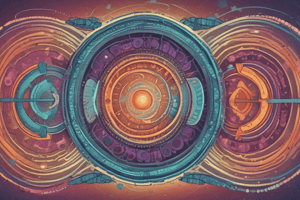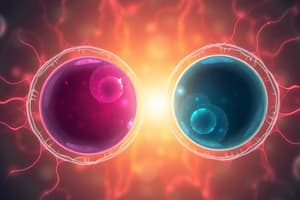Podcast
Questions and Answers
What is the number of chromosomes in a normal human cell?
What is the number of chromosomes in a normal human cell?
- 46 single chromosomes
- 46 pairs of chromosomes
- 23 single chromosomes
- 23 pairs of chromosomes (correct)
Where does meiosis primarily take place in the human body?
Where does meiosis primarily take place in the human body?
- Liver
- Heart
- Brain
- Reproductive organs (correct)
What is the result of the meiosis process in terms of the number of gametes produced?
What is the result of the meiosis process in terms of the number of gametes produced?
- Four genetically different gametes (correct)
- Two genetically different gametes
- Two genetically identical gametes
- Four genetically identical gametes
What is unique about the number of chromosomes in gametes compared to normal human cells?
What is unique about the number of chromosomes in gametes compared to normal human cells?
What happens to the number of chromosomes in a cell after fertilization?
What happens to the number of chromosomes in a cell after fertilization?
What is the process by which the fertilized egg develops into a multicellular organism?
What is the process by which the fertilized egg develops into a multicellular organism?
Flashcards are hidden until you start studying
Study Notes
Meiosis and Gametes
- Normal human cells contain 23 pairs of chromosomes, but gametes (sperm and egg cells) contain 23 single chromosomes.
- Meiosis only takes place in reproductive organs (testes in males and ovaries in females).
Meiosis Stages
- Meiosis involves copying all chromosomes, dividing into two, and then dividing again to form four gametes.
- Each of the four gametes produced is genetically different from the others, with different alleles.
Gamete Characteristics
- Gametes contain single, unpaired chromosomes.
- Each gamete has 23 single chromosomes.
Fertilization
- Fertilization occurs when male and female gametes join together.
- After fertilization, the resulting cell has the normal number of chromosomes (23 pairs).
- The fertilized egg contains 23 chromosome pairs.
Embryonic Development
- After fertilization, the new cell divides by mitosis, producing a clump of identical cells called an embryo.
- As the embryo develops, cells differentiate to form different cell types, such as nerve cells and muscle cells in animals.
Meiosis and Gametes
- Human somatic cells have 23 pairs of chromosomes, whereas gametes (sperm and egg cells) have 23 single chromosomes.
- Meiosis only occurs in reproductive organs, specifically in the testes of males and ovaries of females.
Meiosis Stages
- Meiosis involves two consecutive rounds of cell division, resulting in four gametes.
- The process of meiosis generates genetic diversity among gametes, ensuring that each of the four gametes produced has a unique combination of alleles.
Gamete Characteristics
- Gametes are haploid cells, containing single, unpaired chromosomes.
- Each gamete has 23 single chromosomes.
Fertilization
- Fertilization occurs when a male gamete (sperm) fuses with a female gamete (egg) to form a zygote.
- The resulting zygote restores the normal diploid number of chromosomes, with 23 pairs of chromosomes.
Embryonic Development
- After fertilization, the zygote undergoes multiple rounds of mitosis, resulting in a cluster of identical cells called an embryo.
- As the embryo develops, cells differentiate to form specialized cell types, such as nerve cells, muscle cells, and others specific to various organisms.
Studying That Suits You
Use AI to generate personalized quizzes and flashcards to suit your learning preferences.





